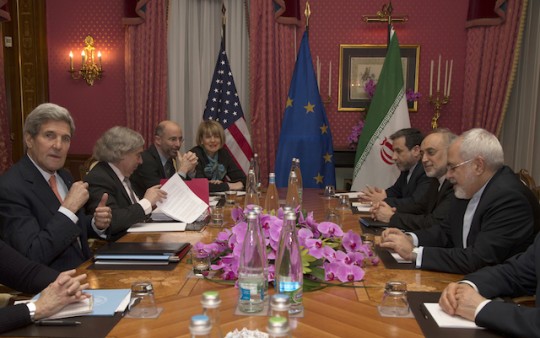Thugs, theocrats, and dictators, take note: among your most important strategic assets is the ability to keep America's liberal elites persuaded that your raw grabs for power are morally insignificant compared to what they see as the U.S.'s legacy of wrongdoing. Your position will be even stronger if you can keep a critical mass of State Department diplomats, writers for the New York Times, and members of Congress believing that your hand has been forced by U.S. policy. You started a nuclear weapons program/invaded a European country/claimed a huge chunk of the Pacific ocean for yourself because America drove you to it! You're depraved on account you're deprived.
Don't worry. This is not a heavy lift. Members of these elites are more than ready to hear you out. Since at least their college days they have been taught to believe that their country, in general, is in the wrong; that its sponsorship of a democratic, rules-based international order has been a cover for the obscene pursuit of corporate profits; that its talk about human rights is meaningless when compared to its sponsorship of brutal right-wing regimes abroad and its own domestic record of racism and bigotry—a multi-century legacy of hatred and greed from which it has only recently begun to emerge. They already believe that the United States has been a force for evil in the world. So when you meet them, whatever the venue—at Davos, or Turtle Bay, or a Clinton Global Initiative event—don't let them forget about this. Their sense that they lack the moral authority to tell you to stop sponsoring terrorism/rebuilding a Slavic empire/claiming Asia for autocracy will be a powerful aid to your designs.
For an example of the mindset of these elites, consider the article published yesterday by the New Yorker's Robin Wright on the legacy of the Iran-Iraq War for Iran's nuclear negotiators. The article lays out a series of incontrovertible and highly relevant facts: that the the Iran-Iraq War, the largest conventional fight between two industrialized nations since the Second World War, was devastating for Iran; that Saddam Hussein's Iraq used chemical weapons against the Iranians; that the United States, and the West in general, backed the Hussein regime in the conflict; and that most of the negotiators--indeed, most of Iran's senior government officials today--had a direct role in this losing, brutal conflict.
All of this is true. Iran's negotiators and senior government officials have a vivid memory of their regime facing an existential threat from a neighbor, and no doubt a deep seated animus against the Western powers who backed Iraq. It seems reasonable to conclude that any hope that these men might negotiate with us in good faith to shut down their nuclear program is completely foolish—a possibility that Wright does not reject, and might even slightly imply. But what is especially interesting about the piece is what it does not mention at all. There is no review of why the U.S. might have had a reason to see the Mullahs lose this war in the 1980s. (Something about American hostages, something about hundreds of dead U.S. Marines ... water under the bridge, these days, at the New Yorker.) There is no mention of the fact that Iran's theocracy was calling for Death to America from its foundation—well over a year before the Iraqi invasion in 1980.
Even more striking than these omissions is the piece's general tone of sympathy for the Iranians and regret for American wrongdoing. Stories of Iranians still suffering today from the after affects of Iraqi chemical weapons are told in vivid terms. Iran is presented as an innocent David, engaged in what it called the "Sacred Defense" against an Iraqi Goliath. ("Back in the eighties, Western intelligence agencies questioned whether Iran’s eighteen-month-old revolution could survive for even a few weeks after Saddam Hussein’s surprise invasion.") American officials from the period are quoted, and you can guess how they feel. ("A senior Reagan Administration official told me that he was ashamed of the covert U.S. role at Faw and during the final period of the war.")
The most important suggestion the piece makes is that the Iranian nuclear program was a direct consequence of the Sacred Defense: "In the final stages, U.S. aid to Iraq contributed to Iran’s decision to pursue nuclear capability—the very program that six world powers are now negotiating to contain." The notion that American support for Mosaddegh's ouster in 1953 was the original sin justifying Iran's revolutionary hatred of the West is commonplace among liberal elites. Wright's suggestion that the West caused the nuclear program by supporting Iraq in the 1980s is an argument less frequently made, but composed of the same stuff. It's of a piece with the claim that NATO's expansion forced Russia to invade Ukraine, or that American support for its East Asian allies has compelled China to stake a claim to vast expanses of international waters. For these elites, whether or not a regime like Iran's can be trusted with nuclear weapons is a secondary consideration. What matters is their belief that we, in our unprovoked belligerence, forced them to pursue nuclear weapons.
For these elites, the problem is always America. Our diplomats, politicians, and journalists do not demand that Iran demonstrate its trustworthiness as a condition for western concessions. On the contrary, it is America that must demonstrate that we can be trusted. Tehran's negotiators must be giddy with the knowledge that, in the minds of the negotiators sitting across from them, it is Iran that holds the moral high ground. Such an advantage—the moral collapse and crisis of confidence among the sponsors of a democratic, liberal world order—is one that such men know how to press.
